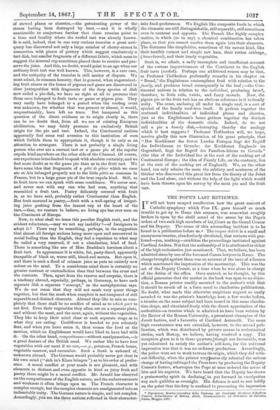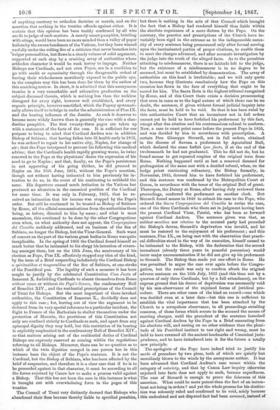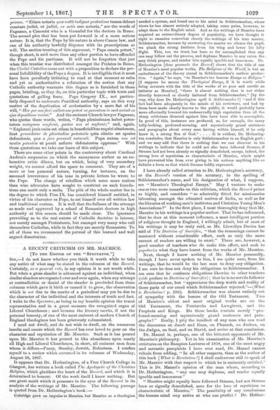THE POPE'S LAST REVIEWER.
IF will not have escaped recollection how the great concert of Catholic symphony which Pius IX. gave himself so much trouble to get up in Rome this summer, was somewhat roughly broken in upon by the shrill sound of the arrest by the Pope's orders of two such high members of his:Court as the Grand Censor and his Deputy. The cause of this astounding incident is to be found in a publication before us.* The corpus delicti is a small and anonymous treatise, clandestinely circulated, that reviews with pro- found—yea, scathing—erudition the proceedings instituted against Cardinal Andrea. Not that the authorship of it is attributed to either of the high ecclesiastics just mentioned. That, we believe, has been admitted since by one of the foremost Canon lawyers in Rome. The charge brought against them was on account of the issue of a licence which sanctioned the impression of the manuscript. This was the act of the Deputy Censor, at a time when he was alone in charge of the duties of the office. Once assured, as he thought, by this official guarantee that the matter in the book was open to no objec- tion, a Roman printer readily assented to the author's wish that it should be struck off in a form usual to clandestine publications. No doubt, what made this otherwise suspicious request so easily acceded to was the printer's knowledge how, a few weeks before, a treatise on the same subject had been issued in this same clandes- tine shape, and circulated freely with the direct approbation of the authorities—a treatise which is admitted AG have been written by the Rector of the Roman University, a prominent champion of the Jesuit faction, and a favourite of Cardinal .Antonelli. The same high countenance was not extended, however, to the second pub- lication, which was distributed by private means in ecclesiastical circles, each Bishop, we believe, having received a copy. The reception given to it in these quarteraphough not favourable, was yet calculated to satisfy the author's self-love, for the universal impression was that it was no ordinary production. Accordingly, the police were set to work to trace its origin, which they did with- out difficulty, when the printer veryinaturAly rebutted the serious charge of having infringed the Press laws by producing the Deputy Censor's licence, whereupon the Pope at once ordered the arrest of him and his superior. We have heard that the Deputy has shown a praiseworthy spirit in declining; to put forward in exculpation any such quibbles as oversight. His defence is said to rest boldly on the point that his duty is confined to preventing the impression * Esposizione Slorieo-Giuridlea della Verienea del Cardloak Oirolamo dArtelrea Veteoeo, Suburbicario di Sabina, Abate, Comnsendllorio, ed Ordinaria di Subiae,o4 Italia, Maggio, le87. of anything contrary to orthodox doctrine or morals, and on the assertion that nothing in the treatise offends against either. It is certain that this opinion has been tacitly confirmed by all who are fit to judge of such matters. A merely smart pamphlet, bristling with stings, would have been no more minded than a volley of paper bullets by the sworn bondsmen of the Vatican, but they have winced ruefully under the rolling fire of a criticism that never launches into vulgar personalities, but flows in a steady volume of solid argument, supported at each step by a crushing array of authorities whose orthodox character it would be rank heresy to impugn. Neither Bishops nor Cardinals, and not even Popes, are in a condition to go with credit or equanimity through the disagreeable ordeal of having their wickednesses mercilessly exposed to the public eye, in the complete way this has been done for them by the author of this searching review. In short, it is admitted that this anonymous treatise is a very remarkable and exhaustive production on the subject discussed therein, which is nothing less than the reckless disregard for every right, however well established, and every organic principle, however sanctified, which the Papacy systemati- cally allows itself to indulge in under the administration of Pius IX. and the heating influence of the Jesuits. As such it deserves to become more widely known than is generally the case with a clan- destine pamphlet. The first twenty-three pages are taken up with a statement of the facts of the case. It is sufficient for our purpose to bring to mind that Cardinal Andrea was in addition Bishop of Subiaco; that having fallen into ill health early in 1863, he was ordered to repair to his native city, Naples, for change of air ; that the Pope interposed to prevent his following this medical advice; that the Cardinal's health rapidly growing worse, he twice renewed to the Pope at the physicians' desire the expression of his need to go to Naples ; and that, finally, on the Pope's persistence in not approving of his going thither, he did proceed to Naples on the 16th June, 1864, without the Pope's sanction, though not without having intimated to him previously his in- tention to do so, in the event of his continuing to withhold the same. His departure caused much irritation in the Vatican but produced no alteration in the canonical position of the Cardinal for some time. It was only in February, 1865, that he re- ceived an intimation that his income was stopped by the Pope's order. But still he continued to be treated as Bishop of Subiaco by Rome, all the official communications from the authorities there being, as before, directed to him by name ; and what is most anomalous, this continued to be done by the other Congregations even when, on what authority does not appear, the Congregazione del Concilio suddenly addressed, and on business of the See of Subiaco, no longer the Bishop, but the Vicar-General. Such want of concert on the part of the various great bodies in Rome was quite inexplicable. In the spring of 1866 the Cardinal found himself so much better that he intimated to his clergy his intention of return- ing amongst them, but on the 16th June, the anniversary of his election as Pope, Pius IX. effectively stopped any idea of the kind, by the issue of a Brief suspending indefinitely the Cardinal Bishop a spiritualibus et temporalibus of the See of Subiaco, at one stroke of the Pontifical pen. The legality of such a measure it has been sought to justify by the celebrated Constitution Cum June of Innocent X. forbidding Cardinals to absent themselves from Rome without cause or without the Pope's licence, the confirmatory Bull of Benedict XIV., and the residential prescriptions of the Council of Trent for Bishops. But the most important of these invoked authorities, the Constitution of Innocent X., decidedly does not apply to this case ; for, leaving out of view the argument to be deduced from its very special reference to a particular incident, the flight to France of the Barberinis to shelter themselves under the protection of Mazarin, the provisions of this Constitution not only are confined strictly to Cardinals as such, and apart from any episcopal dignity they may hold, but this restriction of its bearing is explicitly emphasized in the confirmatory Bull of Benedict XIV., so that matters arising out of the residential duties of Cardinal Bishops are expressly reserved as coming within the regulations referring to all Bishops. Moreover, there can be no question as to which of the twin dignities merged in one person has in this instance been the object of the Pope's sentence. It is not the Cardinal, but the Bishop of Subiaco, who has been affected by the brief of suspension, and therefore it is a clear case that if he is to be proceeded against in that character, it must be according to all the forms enjoined by Canon law to make a process valid against a Bishop. That this has not been the case in this instance is what is brought out with overwhelming force in the pages of this treatise.
The Council of Trent very distinctly decreed that Bishops who abandoned their Sees became thereby liable to specified penalties,
but there is nothing in the acts of that Council which brought the fact that a Bishop had rendered himself thus liable within the absolute cognizance of a mere dictum by the Pope. On the contrary, the practice and prescriptions of the Church have in- variably been rigid in the extreme as to the indispensable neces- sity of every sentence being pronounced only after formal serving upon the incriminated parties of proper citations, to enable them to meet the charges advanced, and after accurate investigation by the judge into the truth of the alleged facts. As to the penalties attaching to misdemeanour, there is no latitude left to the judge, but the existence of a misdemeanour is in no degree to be assumed, but must be established by demonstration. The array of authorities on this head is irrefutable ; and we will only quote two, because they illustrate conclusively how the Pope on this occasion has flown in the face of everything that ought to be sacred for him. The Sacra Rota is the highest tribunal recognized by-Rome, and of this Court there exists a decision pronouncing that even in cases as to the legal nature of which there can be no doubt, the sentence, if given without formal judicial inquiry into• the facts, must be held to be void. So that it has been ruled by this authoritative Court that an incumbent not in full orders cannot yet be held to have forfeited his preferment by this fact, except after due citation and his contumacious refusal to conform.. Now, a case in exact point came before the present Pope in 1853, and was decided by him in accordance with prescription. A certain Don Giuseppe Siccardi, not in full orders, obtained in the diocese of Savona a preferment by Apostolical Bull, which declared the same forfeit ipso facto, if at the end of the- twelvemonth he had not graduated. This he did not do, but he found means to get repeated respites of the original term from Rome. Nothing happened until at last a renewed demand for prolongation of the same met with a decided refusal, when, on the hedge priest continuing refractory, the Bishop formally, in. November, 1845, decreed him to have forfeited his preferment, and this sentence was confirmed by the Metropolitan Court at Genoa, in accordance with the tenor of the original Bull of grant. Thereupon, the Datary at Rome, after having duly reviewed these proceedings, conferred the preferment on another clerk. But Siccardi found means in 1848 to submit his case to the Pope, who ordered the Sacra Congregazione del Concilio to revise the case, one of the three Cardinals who there sat in judgment having been the present Cardinal Vicar, Patrizi, who has been so forward against Cardinal Andrea. The sentence given was that, as. neither monition nor citation to the accused party had preceded the Bishop's decree, Siccardi's deprivation was invalid, and he• must be restored to the enjoyment of his preferment ; and this. sentence, Pius IX., on being met with the observation that practi- cal difficulties stood in the way of its execution, himself caused to be intimated to the Bishop, with the declaration that the second incumbent (already three years in peaceful possession) would incur major excommunication if he did not give up his preferment to Siccardi. The Bishop then made yet one effort in Rome. He- was permitted to argue the case over again before the Congre- gation, but the result was only to confirm afresh the original adverse sentence on the 16th July, 1853 (and this time not by a. quorum of only three Cardinals, but by a full attendance), on the- express ground that his decree of deprivation was necessarily void by his non-observance of the enjoined forms of juridical pro- cedure. There are other cases of the kind on record---one which was decided even at a later date—but this one is sufficient to establish the vital importance that has been attached by the- Church to a scrupulous observance, in all proceedings entailing censures, of those forms which secure to the accused the means of meeting charges, until the precedent of the sentence launched against Cardinal Andrea by the Pope in a Brief emanating from his absolute will, and resting on no other evidence than the pleni- tude of his Pontifical instinct to test right and wrong, must be- held to have reversed all the ancient landmarks of Canonical juris- prudence, and to have introduced into it for the future a totally new principle.
The apologists of the Pope have indeed tried to justify his mode of procedure by two pleas, both of which are quietly but mercilessly blown to the winds by the anonymous author. It has been advanced that Cardinal Andrea's case comes within the category of notoriety, and that by Canon Law inquiry otherwise enjoined into facts does not apply to such, because superfluous. The case of Siccardi is enough to prove the falseness of this assertion. What could be more patent than the fact of an. incum- bent not being in orders ? and yet the whole process for his. destitu- tion was solemnly ruled and confirmed to be void, solely because this undoubted and not disputed fact had been assumed, instead of proven. "Etiam notoria qu as nulls indigent probatione tamen debent constare judici, ut judici, ex actin case notoria," are the words of Fagnano, a Canonist who is a Gamaliel for the doctors in Rome. The second plea that has been put forward is of a more serious nature. It is, that the Pope by his nature is above Canon law, and can of his authority lawfully dispense with its prescriptions at will. The section treating of this argument, " Papa omnia potest;" though short, is said more than any other portion to have offended the Pope and his partizans. It will not be forgotten that just when this treatise was distributed amongst the Prelates in Rome, the Civila Cattolica came out with a proposition to declare the per- sonal Infallibility of the Pope a dogma. It is intelligible that it must have been peculiarly irritating to read at that moment so calm and yet so authoritative a refutation of the notion that any Catholic authority warrants this dogma as is furnished in these pages, bristling, as they do, on this particular topic with texts and quotations of galling force. Pope Gregory IX., not particu- larly disposed to underrate Pontifical authority, says on this very matter of the deprivation of ecclesiastics by a mere fiat of his will, "Hoc per nosfieri nullatenus potest ne peccatum in mea anima ex ejus depositione veniat." And the eminent Church lawyer Fagnano, who quotes these words, writes, " Papa plenissimam habet potes- tatem antequam conferat, postea non ut auferat;" and, again, " Explorati juris enim est etiam in beneficialibus requiri citationem, licet procedatur de pknitudine potestatis quia citatio est species defensionis, qua; a jure provenit naturali. Papa autem non est tantim potenthe ut possit auferre defension6m oppresso." With these quotations we take our leave of this subject.
There are some other points in the controversy about Cardinal Andrea's suspension on which the anonymous author as an ex- haustive critic dilates, but on which, being of very secondary weight, we cannot afford the space to comment. They are of a more or less personal nature, turning, for instance, on the assumed irreverence of his tone in private letters he wrote to the Pope. The charge of rebellion which some more zealous than wise advocates have sought to construct on such founda- tions can merit only a smile. The pith of the whole matter lies in the degree to which Pius IX. has considered himself entitled, in virtue of his character as Pope, to set himself over all written law and traditional custom. It is well that the fullness of the attempt so made and approved by a school of Romanist doctors in high authority at this season should be made clear. The ignorance prevailing as to the real nature of Catholic doctrine is intense, not merely amongst Protestants, but amongst very many who call themselves Catholics, while in fact they are merely Romanists. To all of these we recommend the perusal of this learned and well argued dissertation.
































 Previous page
Previous page